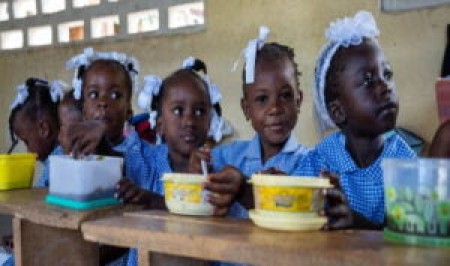UNITED NATIONS – The United Nations says humanitarians continue to support Haitians affected by rampant gang violence in the capital, Port-au-Prince, while an appeal for the French-speaking Caribbean country remains underfunded.
 Children in Haiti eat a hot meal provided by the UN and partners at school (UN Photo)The UN said that the World Food Programme (WFP) continues to provide meals to people who have been forced to flee their homes.
Children in Haiti eat a hot meal provided by the UN and partners at school (UN Photo)The UN said that the World Food Programme (WFP) continues to provide meals to people who have been forced to flee their homes.
It said despite the widespread insecurity, the WFP has delivered food assistance to an estimated 480,000 people across the country since the beginning of March, thanks to partners on the ground, including Haitian non-governmental organizations, local businesses and Haitian farmers’ organizations.
The UN said humanitarian partners also have delivered more than 2.3 million liters of water to nearly 29 displacement sites, benefitting an estimated 60,000 displaced people.
It said traumatized Haitians, including children, have also received medicine and psychosocial support.
In addition, the health sector has been severely affected by the violence over the past month, with the UN saying that at least half of the health facilities in the capital are either closed or functioning below their normal capacity.
“The ongoing insecurity has worsened the already dire humanitarian situation in Haiti,” said the UN, adding that more than 360,000 people are currently displaced, including some 160,000 in the Port-au-Prince metropolitan area, and more than 1,000 schools have been closed across the country.
Meanwhile, the UN said a US$674 million humanitarian plan for Haiti, announced in February, is less than seven per cent funded.
As violence continues to wreak havoc on Haiti, a Haitian-born oncologist in Miami over the last weekend expressed strong opposition to the empowerment of criminals in the country.
In an Op-Ed column in the New York Times, Dr. Jean-Philippe Austin, who is also a co-founder and president of the Haitian American Foundation for Democracy, wrote that fear is what he remembers most about his childhood growing up under a dictatorship in Haiti.
“We could never speak against the president-for-life, François Duvalier. My classmates, the children of regime officials, were dropped off at school by big men with guns.. One night, men came to take our neighbor’s father, and no one ever saw him again. Sometimes, we would walk by the National Palace and avert our eyes, too afraid to even look onto the grounds.”
Dr. Austin, who is also chairman of the Florida Democratic National Committee and executive board member of the Haitian-Americans for Progress (HAP), said it is “agonizing to watch yet another generation of Haitians living with terror.”
He said that since the assassination of President Jovenel Moïse inJuly 2021, the country’s network of gangs, “some sponsored by government officials, have gained territory, arms and audacity”.


